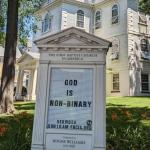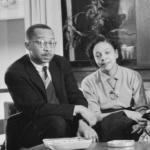R3 Contributor
According to Anthony Pinn, God has outlived God’s usefulness. Imagine a forced retirement party. The CEO of the universe has made a few missteps—misrepresented his enterprise, mismanaged his employees. God’s questionable decision-making forced what was once a private operation to go public. Middle management is handwringing. They know they haven’t represented God as well as they could have. They foresee a hostile takeover but fear there is nothing they can do. Because the majority stockholder is now an African American nontheistic humanist theologian who is convinced that God is too dated to do the universe any good. He presents God with a plaque thanking him for several centuries of service and politely acknowledges that it’s time for him to go.
God’s ouster is the premise of Pinn’s The End of God Talk. He isn’t disrespectful to or dismissive of Christian theism, he simply posits its uselessness while rescuing some of the structures of theology for organizing the lives of African American nonthesitic humanists. Pinn begins by exploring photography and architecture as the places where one can find theology. His most convincing argument for the place where African American humanist theology can develop is in the sociopolitical, economic, cultural, and relational conversations that occur within a barbershop. Pinn describes the barbershop as a safe space where patrons are invited to freely explore “the large questions of life” thus providing the theologian with “vital source material.”
The camaraderie found within the barbershop reflects the importance of community for Pinn but only on a superficial level. He argues that the organizing principle of African Ame
rican nontheistic humanist theologizing is not just a community of living beings or structured social interactions but community also recognizes “the integrity of the quest for complex subjectivity.” Without God at the helm, the foundation of African American nontheistic humanist theology is the push forward, the search for more, the rejection of restraint, the acceptance of struggle, and the embrace of what Pinn describes as “and…”
Read the rest here















